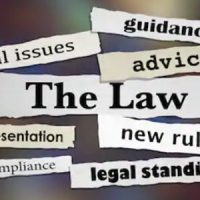Part I: Exceptions to the Hearsay Rule

The “Rule Against Hearsay” is complicated, and it can be difficult to understand the precise legal meaning of “hearsay evidence” and when it is and is not permitted to be used in a criminal case. Many people know a colloquial definition of “hearsay,” often understood to mean something somebody else said that another person repeated. The legal definition is more precise. Under Rule 801 of the Indiana Rules of Evidence, hearsay is defined as a “statement that 1) is not made by the declarant while testifying at the trial or hearing; and 2) is offered in evidence to prove the truth of the matter asserted.” Statements that do not meet the legal definition of hearsay can often be used in a criminal trial by either side.
Yet even when certain information or evidence does meet the legal definition of “hearsay,” it may still be used in a criminal trial in Indiana if it meets one of the many “Exceptions to the Rule Against Hearsay” under Rule 803 of the Indiana Rules of Evidence. There are a total of 23 exceptions that can result in hearsay being included in a criminal trial. Our Indianapolis criminal defense lawyers can tell you more about them and explain them in simplified terms.
- Present Sense Impression
A statement a person made during, or immediately after, experiencing or perceiving an event.
- Excited Utterance
A statement made while under the stress of a startling event.
- Then-Existing Mental, Emotional, or Physical Condition
A statement of a person’s state of mind, such as their intentions, or their emotional or sensory or physical condition, like pain they were feeling at the time.
- Statement Made for Medical Diagnosis or Treatment
A statement that describes a person’s medical history or symptoms for the purposes of medical diagnosis or treatment.
- Recorded Recollection
A record of what a person knew once and made a record of but cannot now recall freshly in their memory.
- Records of a Regularly Conducted Activity
A record of an activity or event, made by a person with the knowledge to make a record, when this kind of recordkeeping was a regular practice of the activity or event.
- Absence of a Record of a Regularly Conducted Activity
Evidence that information is not included in a record, or that a record does not exist, when a record would normally have been made or kept.
- Public Records
A record or statement of a public office made under a range of circumstances.
- Public Records of Vital Statistics
A record of birth, death, or marriage.
- Absence of a Public Record
Information confirming that a public record or public statement does not exist, or that a matter that would have been recorded in a public record did not happen, when recordkeeping of such a statement or matter would normally have occurred.
There are an additional 13 exceptions to the rule against hearsay that you should also learn about if you are facing criminal charges in Indiana.
Contact a Criminal Defense Lawyer in Indianapolis Today
If you are facing criminal charges and have any questions or concerns about hearsay, it is important to seek advice from one of the experienced Indianapolis criminal defense attorneys at Rigney Law LLC. Contact us today for assistance with your case.
Sources:
casetext.com/rule/indiana-court-rules/indiana-rules-of-evidence/rules/rule-802-the-rule-against-hearsay
casetext.com/rule/indiana-court-rules/indiana-rules-of-evidence/rules/rule-803-exceptions-to-the-rule-against-hearsay-regardless-of-whether-the-declarant-is-available-as-a-witness
